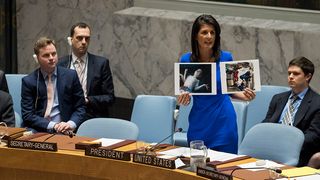President Trump’s disdain for multilateralism has profound consequences, as other states look elsewhere for solutions and leadership on pressing global issues, and powers such as China and Russia seek to fill the vacuum. Certainly, Trump appeared sidelined on trade and climate at the recent G20 summit. America’s withdrawal from the Paris climate accord and the Trans-Pacific Partnership indicates how Trump and some close advisers have a narrow ‘America first’ conception of America’s national interests and a preference for bilateral deals and unilateral action.
But other administration figures, including United Nations Ambassador Nikki Haley, have a more internationalist outlook that is significantly closer to the Republican mainstream. America’s UN policy is still evolving, but it is possible Haley could help incorporate the United Nations and multilateralism into the administration’s modus operandi.
For the first six months of the Trump administration, Nikki Haley has had a high public profile and been a vocal presence at the United Nations. A media-savvy former South Carolina governor, she has used the UN Security Council’s bully pulpit to considerable effect, and been mentioned in some circles as a possible successor to Secretary of State Rex Tillerson.
She has differed from Trump on a number of issues central to the United Nations’ functioning and mandate, including promoting human rights and humanitarian relief, and spoken loudly against Russia’s actions in Ukraine, Crimea and Syria. She has also shown an inclination toward strategic UN reform as opposed to the draconian budget cuts put forward by the White House.
The United States’ UN policy could evolve under Haley to focus on selective aspects of the United Nations that the Trump administration finds useful. The administration has already recognised the UN Security Council’s diplomatic role during the North Korea crisis: Haley worked with Security Council counterparts (including China and Russia) to impose stringent new sanctions on North Korea.
It is in Australia’s interests to promote this approach to the United Nations within the administration, particularly as Canberra prepares to join the UN Human Rights Council in 2018 and seeks to manage potential policy divergences with Washington on the United Nations and multilateralism. Canberra’s active multilateral agenda is based on the judgement that multilateral bodies are key instruments for middle powers like Australia to advance their interests and useful complements to bilateral efforts to combat global challenges.
Continuing to engage with Washington on the merits of the United Nations and multilateralism could help manage possible policy divergences while maintaining a strong Australia-US alliance.
Read more in Elsina Wainwright's brief, Profile in prominence? Ambassador Nikki Haley and the Trump administration’s UN policy.






